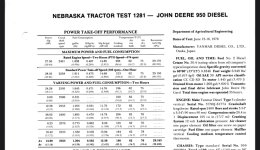2manyrocks
Super Member
- Joined
- Jul 28, 2007
- Messages
- 7,326
Savings offset by fuel use and lack of torque and motor durability.
HP isn't the key factor in a machine used for plowing or mowing.
The gravely L was rated at less HP than the later models with higher HP Koehler engines that operated at higher RPM. Some are of the opinion that the lower HP L was easier to work with than the later models with more HP.
HP isn't the key factor in a machine used for plowing or mowing.
The gravely L was rated at less HP than the later models with higher HP Koehler engines that operated at higher RPM. Some are of the opinion that the lower HP L was easier to work with than the later models with more HP.
